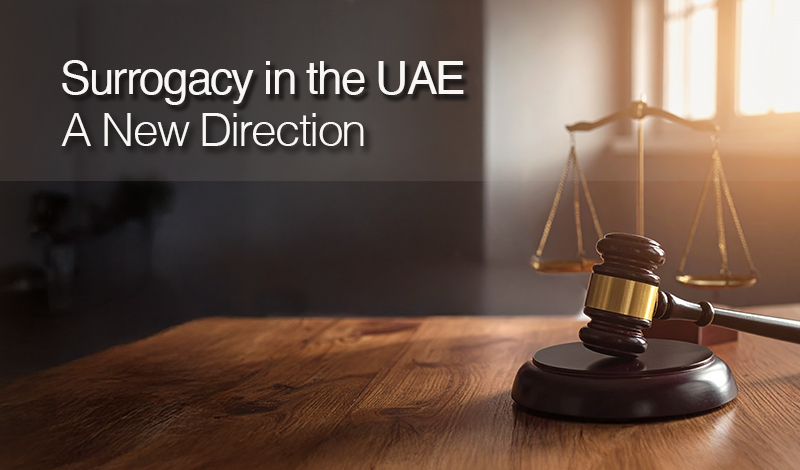Surrogacy is a method adopted by intended parents to have a child, wherein another woman carries and gives birth to the baby on their behalf. After the birth, the child is handed over to the intended parents, who become the legal guardians.
In the United Arab Emirates, surrogacy has become a subject of evolving legal interpretation following the enactment of Federal Decree Law No.17 of 2023,which removed the explicit prohibition on surrogacy previously contained in Federal Decree Law No. 7 of 2019. However, this new law did not establish any federal provisions or regulatory framework to authorize or govern surrogacy practices. Therefore,it cannot yet be conclusively stated that surrogacy is fully legal across the UAE, as there remains no federal law expressly permitting or regulating it.
This legislative change, however, has opened the door for individual emirates to interpret and legislate independently on the matter. In this context, Abu Dhabi became the first emirate, in February 2025, to officially regulate gestational surrogacy, marking a significant step in the UAE’s approach to assisted reproductive technologies.
The Department of Health, Abu Dhabi (DoH) issued the “Standard for Gestational Surrogacy (Full Surrogacy), a comprehensive guideline designed to ensure ethical, evidence based, and patient-centred care throughout the surrogacy process. This standard applies to DoH-designated licensed hospitals and Assisted Reproductive Technology (ART) clinics within the emirate. Meanwhile gestational surrogacy is now legally regulated under Abu Dhabi’s framework, commercial surrogacy, where a woman receives financial compensation beyond medical expenses remains prohibited due to ethical and legal concerns.
Standard requirement and specifications for the hospitals and clinics under this Act.
- License requirements: DoH licensed hospitals and Assisted Reproductive Technology (ART) clinics satisfying licensure requirements to provide maternal, neonatal and ART services.
- Staffing: Ensure the availability of a multidisciplinary team including fertility specialists, obstetricians, psychiatrists, and case coordinators.
- Facility Design: Supportive environments ensuring privacy and confidentiality and to provide quiet areas for counselling to minimize psychological stress.
- Supplies & Equipment: Ensure the availability of adequate supplies and equipment are routinely maintained and serviced in accordance with the manufacturer’s recommendations.
The guidelines further provide for the eligibility criteria for the intended parents and surrogate mother.
1. Eligibility of Intended Parents
- The intended parents must be between 18 and 47 years old and deemed mentally and physically capable of raising a child following assessments by healthcare providers.
- The intended mother has a disorder of the uterus that makes successful implantation impossible or she has had repeated implantation failure or has a history of recurrent pregnancy loss, and this should be based on medical committee for gestational surrogacy approval.
- Intended parents should not suffer from any disease that can be transmitted to their offspring.
- The intended mother cannot attain pregnancy or give birth due to a serious medical condition that puts her or the foetus at risk of death.
2. Eligibility of Surrogate Mother
- The surrogate must be between 21 and 45 years of age, with a BMI ranging from 19 to 30.
- She should have completed at least one full-term pregnancy, with no more than five previous pregnancies in total.
- Surrogate mother should not have had more than two previous Caesarean sections with absence of isthmocele.
- She must undergo and pass both medical and psychological assessments
Gestational Surrogacy Agreement (Legal Agreement)
The law requires all parties (intended parents and surrogate mother) to enter a legally binding legal agreement which is duly notarized adhering to UAE laws. The healthcare facility is required to ensure the proper execution of the gestational surrogacy agreement. The contract must adhere to all applicable laws and executive regulations and must be notarized by a Notary Public.
Additionally, the intended parents are responsible for securing a private insurance policy that comprehensively covers all medical services related to gestational surrogacy. Government-funded insurance programs, including Thiqa, Basic, or Enhanced, shall not be utilized for any surrogacy-related expenses or complications. The child’s birth certificate is issued in the names of the intended parents, with the surrogate waiving any parental rights.
Constitution of the Medical Committee
A Medical Committee for gestational surrogacy shall be established by a decision of the DoH Chairman to assess the medical necessity of surrogacy cases. The committee will include legal and medical professionals. Upon receiving a request from the hospital, the committee will evaluate the case, confirm eligibility, and coordinate with a legal partner to ensure the agreement is notarized. It will coordinate with the facility to oversee the process, review monthly compliance reports, and may request additional documentation as needed.
Conclusion
Abu Dhabi’s 2025 surrogacy standards represent a careful balance between modern reproductive needs and the UAE’s cultural and legal sensitivities. While the emirate has taken a progressive step forward by introducing a clear and enforceable framework, the absence of a federal law means that surrogacy currently remains a localized practice rather than a nationally recognized legal right.
This evolving legal landscape calls upon lawyers, policymakers, and healthcare professionals to re-examine key aspects of reproductive autonomy, parental rights, and bioethical governance within the broader UAE legal framework.
If you are considering pursuing surrogacy in the UAE, our team is here to guide you through every legal and procedural step with clarity, confidentiality, and compassion.

